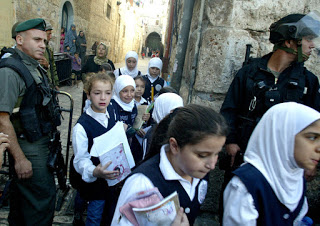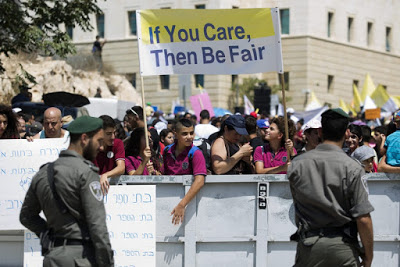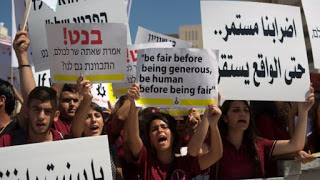 |
|
Israeli policies violate Palestinians’ most basic right to education. Mahfouz Abu Turk APA images |
If you were to believe Naftali Bennett, Israel’s Education Minister and member of the religious settler Jewish Home party, the reason that funding to the independent Christian school network
was being cut was because the State doesn’t like religious schools! There must be a uniform syllabus, Zionist naturally.
This from a Ministry that funds 100% an Orthodox religious sector, which
considers mathematics and astronomy the subjects of the devil, without making
any demands on its curriculum. It was proposed to cut the funding of the Christian schools network, which admits Arabs of all and no religion, to 29% at the same time refusing to allow them to increase school fees.
The real reason is that Israel’s Education Ministry has been
unable to impose its will on one of the remaining independent Palestinian sectors
in Israel. It sought to dictate their syllabus, erasing any mention of the Nakba – the expulsion of the Palestinian refugees. Schools were to become merely a conduit for Zionism’s false history.
Below are two articles from Electronic Intifada and a report from the Times
of Israel on the defeat that the Zionists have suffered as the Pope came out
clearly in opposition to Zionism’s racist agenda.
Tony Greenstein
Israel starves Christian schools of funds
 |
| Palestinian Christians protest discriminatory school funding outside Prime Minister Benjamin Netanyahu’s offices in Jerusalem on 6 September. Abir Sultan EPA |
Staff in 47 Christian schools serving Palestinians within present-day Israel
have gone on strike to protest against funding cuts imposed on them by the
government.
They say they may escalate
their protest by seeking the closure of Christian holy sites that attract
thousands of tourists each year.
While the State of Israel previously funded up to 70 percent of the budget
for these schools, it has sharply reduced its contribution during the past few
years. Today, the state pays only 29
percent of their operating costs.
Palestinian
citizens of Israel perceive the cuts as an attack on their culture and
identity.
The Christian schools — which teach 30,000 children — are among the few
Palestinian institutions in present-day Israel that survived the Nakba, the ethnic cleansing
conducted by Zionist forces during and after Israel’s establishment in 1948.
Run on a semi-public basis, they follow the core Israeli curriculum but also
give lessons on religion and Palestinian history.
The funding cuts appear discriminatory. Schools for ultra-Orthodox Jews in
Israel have similarly been run on a semi-public basis, even though they focus
on religious instruction, rather than the Israeli curriculum.
Yet the Israeli government has steadily increased its funding for such
schools in recent years to the extent that they are almost totally financed by the
state’s budget.
Palestinian Christians comprise
less than 2 percent of Israel’s population. Their schools — which accept
Muslims and Druze
students, too — are high-performing, with a large number of their pupils later
attending university.
Rani Khoury, a Palestinian from Nazareth, went to a
Christian school. He said that the Christian schools have “allowed Palestinians
to retain their education and they created a lot of leaders in Palestinian
society.”
Khoury described his school as “very political.”
“I learned about the Nakba at school, as well as Israeli history, but from a
Palestinian perspective,” he said.
Protests against the funding cuts have taken place in various towns and
cities in present-day Israel such as Haifa, Nazareth, Ramleh
and Shefa Amr.
In June, hundreds of Palestinian high school students protested at the
Israeli education ministry, accusing the government of trying to force
Christian semi-public schools into the state system.
“If the schools continue like this, they will go bankrupt,” Khoury said. “We
should do more than just the strike. The government doesn’t care. You don’t see
this on Israeli news channels; only Arabs know about it.”
In total, one-fifth of Israel’s inhabitants are Palestinians. Yet the state spends an average
of 24 percent less on each high school pupil who is a Palestinian citizen of
Israel than on his or her Jewish counterparts.
“Divide and conquer”
Rabea Fahoum, who attended a Christian school, said that such schools have
struck a balance between meeting the needs of Palestinian students and the
requirements of the Israeli state.
“In our school, we had many projects that were designed by the students and
we could decide. We closed the school once. We also had a radio, which played
political songs. When the state inspector came to the school, the principal
would come to us and say ‘Don’t put any political songs on today, okay?’ And we
would say, ‘okay.’”
“The students were from middle class families, all very educated and with a
high level of political consciousness,” Fahoum said.
“This funding cut is not about the money,” Fahoum added. “There aren’t that
many Christian schools, and most of them are in Nazareth. It’s a tactic to
divide and conquer. The most important institutions that don’t allow
Palestinian identity to be eroded are these schools. Today, you have a specific
curriculum for Druze [in Israel] but you don’t have one for only Christians or
only Muslims. They want to continue dividing us. ”
By accepting Muslim and Druze students, the Christian schools forged a sense
of unity among Palestinians in Israel, according to Fahoum.
“Fragmenting our identity”
“For the Muslims who went to these schools, it’s personal,” Fahoum said.
“The Christians gave us services. It [the Christian school system] prevents
them from fragmenting our identity, and I believe that is why they are
attacking these schools.”
As well as reducing funding for Christian schools, the Israeli government
has placed a strict limit on the amount that parents may contribute towards
their children’s education.
That cap
has been set at 2,500 shekels ($645) per year, according to one school
administrator. The Christian schools estimate that they would need to charge
twice that amount to compensate for the cuts in state funding.
After the strike began in early September — the start of the school year —
the Israeli government responded by offering
a 5 percent increase in spending and by allowing the Christian schools to raise
their fees.
Representatives of the Christian schools rejected the offer. The schools are
recognized by Israel but are not fully registered in its education system.
Schools with that status are entitled to 75 percent state funding, the
representatives have pointed out.
Burhan Kanj, a past-pupil of a Christian school in Nazareth, argued that
Israel is striving to “make it impossible” for these schools to function.
“You can see they’re not doing this for private schools in general,” Kanj
said. “They are only attacking the Arab Christian schools.”
Alia Al Ghussain is a British-Palestinian born and raised in Dubai. She
holds an MA in human rights from the University of Sussex and is currently
based in Haifa.
With deal said reached, Christian
schools expected to halt strike
System to receive NIS 50 million from EducationMinistry, letting 33,000 students go back to class; official announcement planned for later Sunday
 |
| Arab Israeli Christian students hold placards during a protest to demand more funds for Christian schools, on September 6, 2015 in Jerusalem. (Menahem Kahana/AFP) |
four
weeks at home, pupils in Christian schools in Israel will resume studies on
Monday, after a dispute between the council representing schools and the
Education Ministry was resolved, sources said Sunday.
sides held discussions on Saturday evening that extended late into the night
and finally reached a breakthrough on Sunday morning, the Hebrew-language Haaretz
daily reported.
to the agreement, the system of 47 schools, in which some 33,000 mostly Muslim
children study, will receive NIS 50 million ($12 million) from the state and an
additional NIS 7.5 million ($2.7 million) as a bonus.
schools had been on strike since the start of the month over budget cuts
officials said amounted to hundreds of millions of shekels.
sides had been stuck over a demand from the Education Ministry that the schools
keep from calling any more strikes until the end of the 2017 school year, while
the school system would only agree to not strike until July 2016.
compromise agreement will keep junior high and high schools from striking until
July 2017, while elementary schools won’t strike until July 2016.
new joint committee will be established and regulate relations between the
church schools and the Education Ministry, Haaretz reported.
details of the full agreement between the schools and the ministry will be
presented on Sunday afternoon at a press conference in Nazareth.
Israel’s assaults on Palestinian education amount to genocide
Israeli
policies violate Palestinians’ most basic right to education.
Mahfouz Abu Turk APA imagesA strike
by staff and students at 47 Palestinian Christian schools in Israel had been
taking place for a few weeks before the American broadcaster NBC took notice.
According to NBC’s headline,
the protest was about “discrimination.” That it felt the need to put quotation
marks around “discrimination” was indicative of how the mainstream media in the
United States continuously fail to acknowledge that Israel is, fundamentally, a
racist
state.
The Christian schools represent some of the few independent spaces for
Palestinian political, cultural and economic life within Israel. So the cuts in
government funding that triggered the strike must be understood as the latest
move in the Israeli assault on Palestinians’ right to education.
That assault began at the time of the Nakba, the 1948 ethnic cleansing
of Palestine.
Its effects
can be seen in the recent cuts (the schools have seen the proportion of their
operating costs covered by the state fall
from 70 percent to 29 percent), the violation of the freedom of movement of
schoolchildren and teachers in the occupied West Bank and harassment by Israeli settlers and
soldiers, the targeting and arrest of politically
active students, the raiding
of Palestinian universities at will and the firing of tear gas into campuses,
the bombing
of schools in Gaza, the denial
of exit visas and travel permits to Palestinians wishing to study abroad or
even
elsewhere in Palestine and of entry visas to Palestinians with American and
other citizenship who wish
to teach in their homeland.
These assaults on education are part and parcel of a larger structural
assault on the very heart of Palestinian social life. Meanwhile, semi-private
Jewish religious schools, which fall in the same category as the Christian
Palestinian schools, have seen their government funding increase to 100
percent of their operating costs.
The historical context of today’s crisis in Palestinian education is
critically important for a full understanding of why the recent cuts are viewed
as the latest attack in the ongoing assault on Palestinian culture, identity
and leadership. It also helps explain the Palestinian call for an academic and cultural
boycott of Israel, until educational apartheid is ended, as
well as the broader demand that the Palestinians’ right to education be
guaranteed.
Devastating impact
The Nakba had a devastating impact on Palestinians and their education, and
as with all examples of Palestinian dispossession, the harm is ongoing.
In the mid-1940s, there were 478 schools governed
by the British
Mandate authorities in Palestine. There were also 317 private schools, of
which 135 were Islamic religious schools and 182 were Christian religious
schools.
In 1948, after the establishment of Israel, only 45 Arab elementary schools
and one high school survived. Islamic private schools were eliminated, because
Islamic Waqf endowments — religious endowments by a Muslim council established
in 1921 — were terminated. Waqf property was considered “absentee property”
according to Israel’s law and these schools came under the jurisdiction of the
state.
Israel allowed some of the Christian schools to reopen on condition that
they operated under the auspices of the state’s education ministry. Until 1957,
Israel did not recognize any of the Christian schools or their certificates.
Today, Palestinian schools in racially segregated towns and villages inside
Israel are severely underfunded. Some Palestinians don’t get any education
services at all.
More than 90,000 Palestinian
Bedouins who live in villages “unrecognized” by Israel in the Naqab (Negev) and Galilee regions do
not receive the full services normally provided by the state, including
education. Even when such villages are granted “recognized” status by the
Israeli government, as happened in 2003 to Abu Tulul and seven
other villages, the authorities have dragged their feet,
delaying the lengthy process to build a school.
Educational apartheid in Israel must be understood for what it is: an
attempt at cultural genocide. Under the United Nations’ 1948 definition
of genocide, this crime may include imposing conditions of life on a racial or
ethnic group with the intent of wholly or partly destroying that group.
Denying essential services to Palestinians, or forcing them to accept a
lower quality of education than provided for Israeli Jews, fits that
description.
With the exception of a handful of mixed schools, schools in Israel serve
Jewish Israelis and Palestinians separately. This separation is within secular
government-funded schools, not just the religious schools.
Discrimination in East Jerusalem
Because East
Jerusalem has been illegally annexed by Israel since 1967, the educational
situation for Palestinians there is in a bizarre category of its own.
Separation and unequal funding policies governing the education sector in
East Jerusalem are designed to maintain the economic gap between the Jewish
(largely settler) population and Palestinians there. The infrastructure is
pitiful, creating unsuitable conditions for learning, which must sometimes be
conducted in rented houses or apartments, and frequently lacking in equipment
and specialized rooms such as science labs.
The al-Tur
neighborhood is an especially disturbing example.
The neighborhood is densely populated and the land reserve on its western
edge, which had been zoned for a Palestinian girls’ school, was bought
in the early 1990s by Irving Moskowitz,
a wealthy American businessman whose “philanthropy” seeks to create a Jewish
majority in East Jerusalem. Today, a yeshiva (Jewish religious school) stands
there, as well as Beit Orot, the first Israeli
settlement to be built in the heart of a Palestinian neighborhood of East
Jerusalem.
The neighborhood’s remaining land reserve has been zoned by the Israeli-controlled
Jerusalem municipality for a nature reserve and national park.
Only half of Palestinian children in Jerusalem were enrolled
in the public school system, a study conducted in 2010-2011 found. Meanwhile,
costly private schools are largely unsupervised and often fail to provide basic
learning conditions. Palestinian children have limited opportunities of going
on to study in Israeli universities or to obtain jobs with decent pay.
The Israeli government recognizes only one politicized curriculum — its own
Zionist one.
This curriculum uses Zionist terminology to describe geographic areas in
Palestine, like Judea and Samaria for the West Bank and Temple Mount for Haram
al-Sharif, the compound that houses al-Aqsa mosque.
The Jerusalem municipality has offered a financial incentive of $550 per
student to Palestinian schools in East Jerusalem not under its control —
including Christian schools — to follow the Israeli curriculum, The New
York Times reported
last year.
The paper added that Israel revised the Palestinian
Authority textbooks used by more than 32,000 Palestinian children who study
under Israeli control, taking out, in a third-grade history textbook, for
example, large sections of text and several images, including the Palestinian
flag, text from the Quran, and information about the late Palestinian leader Yasser Arafat.
Education must be empowering, enriching, liberating. Yet the Israeli
government is using discriminatory funding and red tape to deny Palestinians
this basic right.
Parents, teachers and human rights activists must stand up to this latest
attempt at cultural genocide, and hold Israel accountable for its violation of
the right of Palestinian children to learn their own history.
One strategy to hold Israel accountable is heeding the Palestinian call for boycott, divestment and
sanctions until Israel respects the right of Palestinians to equality,
dignity and sovereignty. Otherwise, Israel’s education system will remain one
in which the indigenous people of Palestine are required to learn the Zionist
rationales for the racism inflicted on them.
Nada Elia and Rima Najjar are members of the steering collective of the US Campaign for the Academic and Cultural Boycott
of Israel (USACBI).